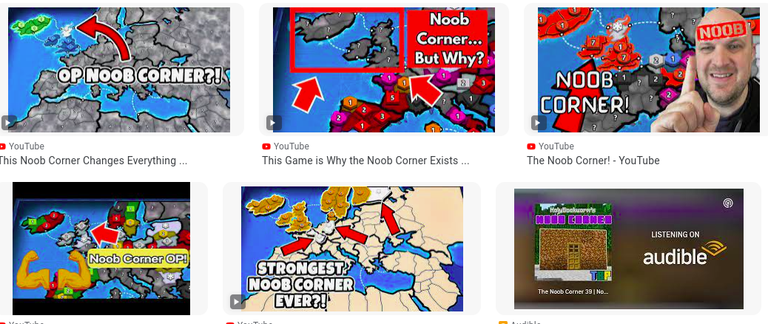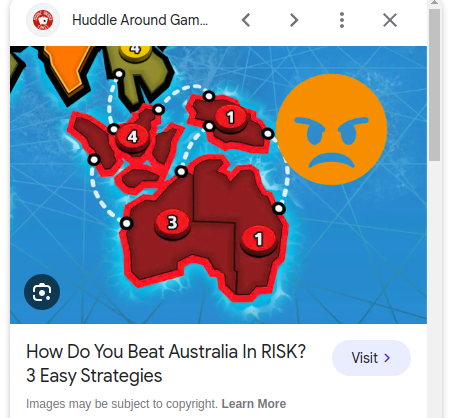Game Theory Concept: The 'Noob Corner'
So in my last post, I introduced all of you to Kill Pete, a youtube channel dedicated to watching some canadian dude play risk. Sounds silly, but I have found a lot of value in it, as I mentioned in that post. Today I would like to walk you through one of the most important game theory concepts I have learned through watching this channel, that of the 'noob corner'.

The concept of the Noob Corner comes from the Europe Advanced map, and refers to the corner of UK + Iceland, and sometimes Scandinavia, depending on the Blizzards. Its a powerful little set up, where you can defend some easy to take bonuses early and (hopefully) start to snowball, which is the best position to find yourself in when you are playing a game of risk.
The classic map also has something similar, its the Australia position.

So, is Australia bad in risk? No, especially in the early game its a really good position. Sure, later in the game it can be easy to get locked in and fail to take cards, but at least at the start of the game, it can be quite good, and an advantage even.
So why is it considered a 'noob' play to go for australia, or the 'noob corner'? Precisely because these positions are considered good, new players will often fight people over them, and even aggressively (noob) slam their troops into these positions, which with how risk works, can often be fatal for both the defender and the attacker. Okay, there is a lesson in here.
So this is deeper than Pete's usual advice, which is to try to figure out what the other players want and to get out of their way, itself a bit counter intuitive for a competetive game. Of course you need to get out of the way of any noob slams, but there is a deeper lesson in here that I have been contemplating recently.
Easy 'advantage' acts like a magnet
So, this makes sense, we all want to do 'the right moves' to win the game, whatever game that may be (game of life). I'm thinking here of the mantra of an entire generation (my generation 😭) - "Go to College!"
When I was growing up, it was the obvious play - go to college, that's not an option. Tons of evidence was thrust in front of us, college educated people get better jobs, better pay, happier lives and so on and so forth.
Nowadays, suddenly we were idiots. No one forced us, we were just bad at math, probably greedy and foolish, and should have known better. People in the 'trades' are earning more, entreprenuers do not need college, and college debt (both money and time) hangs on the necks of those who made these decisions for the rest of their lives. I can count on one hand the friends of mine who are actually working in a field related to what they studied, and most of these are in 'accounting'.
Each additional participant to rush in produces a diminishing marginal return
Not only this, but on the college front, it also increased the cost, and seemingly decreased the quality of the proposition. Which is exactly what we should expect in any market, that participants would enter until it became a generally negative, niche play (I learned this in college studying economics).
Now, I made the best of the situation regarding college. Despite being buffaloed into doing it, I took the best of what came as I slowly became aware that I had chosen the wrong path. That is, I dropped out after 6 semesters. At the time, it was hard for other people to understand, in fact it had not yet come to the mainstream what we now know about college, it was still very much "you MUST go to college, its not an option".
But it was no longer an option for me. I didn't really know what my options were yet, but I got out of the way before the noobs started slamming into me. Later, I leveraged my position to advantage by finishing a degree in Sociology 'at a distance', living off the Pell Grant for two years in a low cost of living corner of a mountain in South America.
Copy paste your way to "success"
There are so many examples in the world, its really amazing that some obscure risk terminology has helped me articulate this concept. In Colombia, the coffee boom is a great example, growing coffee was very successful in the 70s and 80s, and they didn't even need fertilizer because the volcanic mountian soils were rich and they grew them under nitrogen fixing trees.
But with more and more people rushing into the market, and the development of the 'sun-resistant' variety of coffee plant, they eventually chopped down those nitrogen fixing trees to fix more coffee per hectare and absolutely jammed as much coffee into the country as was physically possible.
Now growing coffee is a marginal activity at best, but it still amazes me that everytime the price goes up a bit, which for the farmers just off sets the unprofitable periods, there are new participants planting coffee because 'its profitable'. Yeah, but it won't be by the time you are harvesting, bro.
Don't forget the 4th dimension
Whether its agriculture, education or even a game of risk, decisions made now, in the present tense, must be analyzed in the 4th dimension, that is, in the future. What may seem like a bad decision now, might look really smart in the future phase of analysis. Or viceversa, things that look smart and even obvious now, might be terrible decisions looking back.
Which is the entire concept of 'noob corner' in a nutshell. You think it looks good now, but you probably won't like how it plays out.
But since the future is unknown, how can we use these concepts in the present tense? Be careful doing what everyone else is doing, no matter how 'obvious' it may seem. And although just because no one else is doing something doesn't necessarily make it a good idea, find yourself an enjoyable niche where not a lot of other people are competing with you. Learn the difference between 'best practices' (techniques) and copy pasting strategies.
!BEER
View or trade
BEER.Hey @ecoinstant, here is a little bit of
BEERfrom @edgerik for you. Enjoy it!We love your support by voting @detlev.witness on HIVE .
Well said mate, you totally nailed it, I like to play chess and consider myself a noob, but every time I blunder into a trap, I learn for next time and even try the same trap on others.
This is the way!
This is a game that especially men have a lot of interest in and the skills of a person improve a lot by playing. The video is also very good.
Here's an even better example: